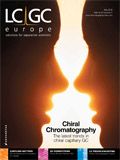Event News
Event news summary
4th International Conference on Polyolefin Characterization (ICPC)
The 4th International Conference on Polyolefin Characterization (ICPC) will to be held on 21–24 October 2012 in The Woodlands, Houston, Texas, USA.
Being co-organized by Polymer Char, ICPC covers different aspects on polyethlyene (PE) and polypropylene (PP) molecular architecture characterization, including molar mass distribution (GPC/SEC), comonomer incorporation and distribution, long chain branching, crystallinity and rheological properties.

ICPC is targeted at researchers typically working at polyolefin producers and processors, contract research organizations, government laboratories, academia, analytical and testing laboratories and instrumentation developers.
The 4th ICPC will take place in The Woodlands, located 32 miles north of Houston, Texas, USA, a thriving downtown in the forest that has become a regional destination for business, culture and entertainment.
The technical programme will consist of lectures and posters in separation and fractionation, molecular structure and properties, morphology, thermal analysis, rheology and spectroscopy.
A short course on analytical and preparative separation techniques is scheduled for 21 October. This one-day course complements the meeting by providing new researchers an opportunity to engage the world's experts to share their knowledge and experiences of polyolefin characterization. Topics covered are introduction to polyolefin microstructure, GPC/SEC practical considerations and applications, chemical composition distribution (TREF, CRYSTAF and CEF), cross fractionation, high temperature HPLC and preparative fractionation.
Previous conferences have been held in Houston, Texas, USA, in 2006, in Valencia, Spain, in 2008 and in Shanghai, China, in 2010. In this way the event has covered the whole world map and become a truly international conference on the field of polyolefin characterization. With attendees from over 20 countries and from the leading polyolefin players, ICPC unifies the participation of researchers from both industry and academia throughout the continents.
The ICPC technical committee is represented by Dr Benjamin Monrabal (Polymer Char, Spain), Dr Colin Li Pi Shan (The Dow Chemical Company, USA) and Prof João Soares (University of Waterloo, Canada), who founded it together. Later, in 2008, the committee was pleased to welcome Prof Minoru Terano (JAIST, Japan Advanced Institute of Science and Technology, Japan) and Prof Dujin Wang (ICCAS, Institute of Chemistry, Chinese Academy of Sciences, China), in 2010.
E-mail: raquel.ubeda@icpc-conference.org
Website: www.icpc-conference.org
13–15 June 2012
13th Fera/JIFSAN Symposium 'Omics' Technologies in Food Science
Sand Hutton, York, UK
Tel: +44 (0)1904 462000
Fax: +44 (0)1904 462111
E-mail: infor@fera.gsi.gov.uk
Website: www.fera.defra.gov.uk/events/jifsan2012
16–21 June 2012
38th International Symposium on
High Performance Liquid Phase Separations and Related Technologies (HPLC 2012)
Anaheim, California, USA
Organizer: CASS
E-mail: rolson@casss.org
Website: www.casss.org
24–26 September 2012
ExTech 2012, 14th Symposium on Advances in Extraction Technologies
University of Messina, Italy
Organizers: Luigi Mondello, Chromaleont, University of Messina, Italy
Tel: +39 0906766536
Fax: +39 090 358220
E-mail: extech@chromaleont.it
Website: www.chromaleont.it/extech
3–5 October 2012
SFC 2012 – 6th International Conference on Packed Column SFC
The Square, Brussels, Belgium
Organizers: The Green Chemistry Group
Tel: +1 412 805 6296
Fax: +1 412 967 9446
E-mail: register@greenchemistrygroup.org
Website: greenchemistygroup.org
6–8 February 2013
6th International Symposium on the Separation and Characterization of Natural and Synthetic Macromolecules (SCM-6) Dresden, Germany
Organizer: Albena Lederer, SCM-6
Tel: +49 351 4658-282
Fax: +49 351 4658-214
E-mail: scm-6@ipfdd.de
Website: www.scm-6.de
Send any event news to Kate Mosford kmosford@advanstar.com
Removing Double-Stranded RNA Impurities Using Chromatography
April 8th 2025Researchers from Agency for Science, Technology and Research in Singapore recently published a review article exploring how chromatography can be used to remove double-stranded RNA impurities during mRNA therapeutics production.
The Effect of Time and Tide On PFAS Concentrations in Estuaries
April 8th 2025Oliver Jones and Navneet Singh from RMIT University, Melbourne, Australia discuss a recent study they conducted to investigate the relationship between tidal cycles and PFAS concentrations in estuarine systems, and offer practical advice on the sample preparation and LC–MS/MS techniques they used to achieve the best results.











